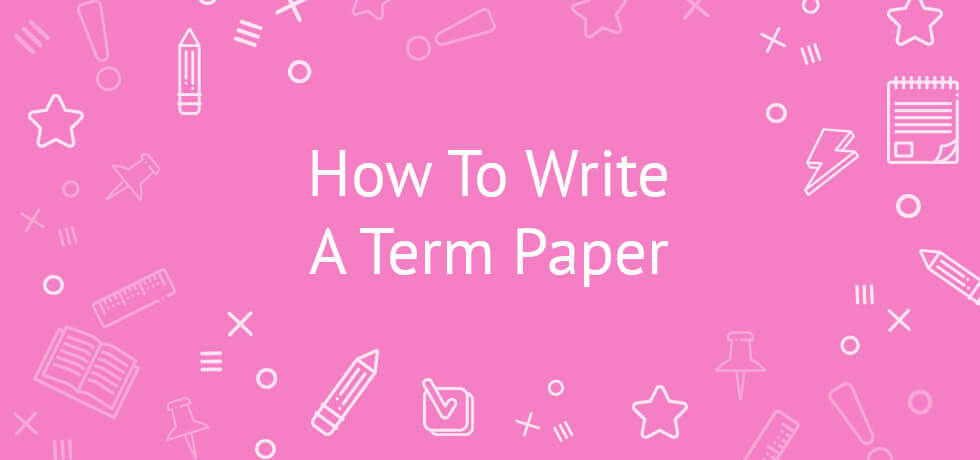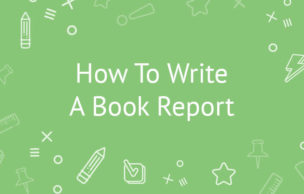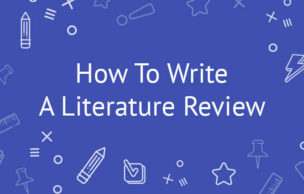How To Write a Term Paper

Some students are completely satisfied with average grades. Why wouldn't they be? C’s are still a passing score. They even say that the students that usually get C’s are more flexible and prepared for the difficulties of our life better than those who get straight A’s. Just wait for some time and check if it’s true. On the other hand, you may want your family to be proud of you today or, moreover, be proud of yourself. That is why you should grab the opportunities now when you are still a college student.
#1 It Is Vital to Have the Right Topic
There are two options for how you get a topic: to pick it yourself or to be assigned. In both cases, the topic should be closely related to the subject. It is actually pretty good if you have an opportunity to choose a topic, although it is quite a difficult task even for the most brilliant students. It shouldn't be on the surface, and you are to be interested in it. If you find a topic that meets these requirements, it will be quite easy to write about. The main problem is to find it. You may consider some life aspects you are interested in from the standpoint of your subject. There is always a way to make your topic unordinary and interesting, either for you or your reader.
Mind that the topic should be brief and accurate. Don't try to cover too broad areas, general truths, and phenomena that have been well-researched before. A unique topic which can have a real applied significance is much beneficial for you than some general chattering. If you have been given a topic, it's rarely original. But it doesn't mean that you are to write a cliched paper. You can look at it from an entirely new point of view. You aim not to surprise (or even to appall, which some students mistakenly do) your teachers with your arguments, but to show that you are able to think outside the box.
When you are writing on your own topic or the one that has been given to you, you should be open to the new conclusions. One of the most widespread mistakes that students do in the process of writing is establishing the bottom line before the arguments. In such a case, you get very limited, because you only search for information that proves your point.
The research that is worth conducting can lead you to the most unexpected results. Besides, it is much more fun to be in a constant search of new facts than to use the facts you already know to manifest something you already know. The result you determined before the actual research is in general useless, as it presupposes no real analysis. Don't be afraid to challenge yourself and be ready for discussion and reasonable objections. The latter will only show that you've touched upon the issue that can't leave your reader independent.
#2 Never Stop Researching
The thought that all the process of studying is about the grades may be just misleading. On the one hand, it is. But again, if you all you want is to pass, you’ll get a C. There are much more behind A’s. Excellent grades are based on the following:
- whether you’ve got new knowledge;
- to what extent you’ve mastered it;
- and if you can use it.
All these factors are apparent from the way you do your research. As a result, research becomes one of the most important aspects of your performance.
Some students mistakenly believe that at some point they won't have to research their papers anymore because they’ll have enough knowledge to cover all study-related topics. They couldn't be more wrong! You get a lot of advantageous information while researching. You can use it in your future work. However, you are always to add something new each time. That is how you progress: you enlarge your scope of knowledge and process information each time you get new facts. For this purpose, you are to use primary sources. New ideas can be developed with the help of secondary sources and interaction with other researchers. Now, you can discuss your topic with other students, for example. Please, mind that, as we’ mentioned above, the discussion may (and sometimes should) take the form of argument, because it is the truth that usually springs from it.
#3 Work on a Clear Thesis
There is always some room for change. You can choose your point of view at the problem and your attitude. You can even choose your topic in the process of writing. It usually happens not because you get bored of what you have been writing up till now, but because you’ve got some better ideas on the subject, no matter how distant they are from your initial point. But is there a final destination? If you don’t see the difference between searching and researching, creative musings can last forever, you know. But if there is a deadline, you have to stop at some point. It seems that the thesis statement is created for the most devoted seekers. You have to sum up the final ideas at the very beginning. This has nothing to do with the case that we’ve already discussed when you know exactly where your research is going. In that case, your mind gets fixed at a particular thought and makes you throw away any additional, ‘undesirable’ information. Here, you refine your main idea to see where your research should (not must) lead you and, in the final draft, to show your reader that it actually makes sense. This is more like a part of planning than a strict prescription for the future work. Besides, you can change your thesis too, if eventually, you don’t find it substantial anymore. Although, try to avoid it. Remember that it is always better to stick to your plan than to switch from one thing to another all the time.
#4 Don’t Neglect the Outline
If you can write a proper term paper without an outline, there are two possibilities of what actually happens. First, you are a natural-born genius with an incredible memory and outstanding writing skills, which by the way miraculously exclude writing an outline. Plus, you have plenty of experience in writing this kind of papers. Looks true? More likely, you THINK that you can go without an outline because of the lack of experience. Remember that all the credible researchers you are about to cite in your paper use outlines to write their research articles, all the speakers outline what they are going to say first, and all the authors outline their plots. In other words, EVERYTHING that is being written is to be planned ahead with the help of an outline. Otherwise, it either won’t lead you anywhere or will take you plenty of time and effort to complete. For your term paper, a proper outline should be more than an enumeration of the paragraphs. Every point, including the introduction, the main body (description, analysis, and argument), and the conclusion should be summarized in a couple of sentences or/and with the help of bullet points to give a more or less full picture of their content.
#5 The Introduction: Your Work in Miniature
It is curious that there are many arguments as to when students are to write the introduction. It seems obvious for many people that, if it is the first thing in the paper, it should be written before all the other parts. Others see the introduction as the scope of their paper, so they tend to write it after the whole research is almost completed. The third type writes the introduction at the very end, simply paraphrasing the conclusion. The latter approach can have disastrous consequences. You have to understand what the final draft of the introduction is in the core. It is introducing the reader to something you already know. But this is true only for the last version. So, what you are to do is to write your introduction beforehand: it should be revealing your topic, giving some general information about it, stating your thesis, and explaining the major notions that are going to be under consideration. Then, you have to return to the introduction over and over again, checking if its tiniest detail is influenced by your research. Thus, the introduction is being edited during the whole process of writing and only that way it can correspond with the paper perfectly.
#6 Writing the Main Body: Develop Your Ideas and Give Arguments
Don't mix up your research paper with a persuasive essay. Every paragraph in the main body of your work should contain either convincing facts or/and strong arguments. Mind that what seems a universal truth to you might not be as obvious to your reader. So, support each point you mention. It is not enough to write “It is well known that…” in the majority of cases (although you can use it once or twice in your work). You should only repeat those if really needed. Some paragraphs are to relate the theory you use with a practical sphere in which you may have some experience. Of course, you shouldn’t write about yourself, as if it is a reflective paper.
#7 Decent Conclusion
The conclusion is an important part of the sentence. No matter how scrupulous your teachers are, they may start reading your paper from the end just because they are interested in what you’ve come to. Your conclusion should obviously contain a summary of your work. But besides this, it should include elements that will make it more valuable.
First of all, it is important to re-establish your main thesis. Secondly, you may add one new fact that will appear at the end. It should be interesting to the reader but not critical for the research. Otherwise, why haven’t you mentioned it before? Besides, you can leave some issues opened for the further discussion.
#8 The Importance of Being ‘Stylish’ or Much Ado about Quotes
The style of a term paper presupposes much more than an accurate choice of words and avoiding short forms. It is about structure and format. We have discussed structure in the Outline section. As for the format, it is crucial to find out which one is required long before the deadline. If you don’t do it, you can waste loads of time to learn about the format you need. It is better to do it gradually and thoughtfully. For this purpose, you can use various tutorials and manuals, like YouTube videos, Purdue materials, etc. The format also influences citation. Credible quotations are obligatory to use, but there is usually a certain percentage of them that should be present in your text. Plus, your teachers are more interested in your understanding of other people’s ideas than in the ideas themselves. So, you have to work with quotations and analyze them, instead of stuffing your work with never ending quotes. Use only reliable sources and never copy and paste from different web pages.
#9 No Empty Talk Allowed
A term paper should contain the least number of stop words possible. Your sentences should be short and informative. You also should avoid passive voice and unnecessary massive grammar constructions. Remember that your term paper is not about volume. It is about conveying proper ideas and quality research.
#10 Proofreading Is Half a Job
Different students imagine proofreading differently. Unfortunately, some of them rely too much on new technologies. Grammar and spelling checkers are a great proofreading tool, but using them is not nearly enough for a good result. A very small amount of students re-read their works at least once after they are finished. So, you may ask why you should do it if the majority does not. The point is that your teacher will understand you anyway, but let us not underestimate the factor of respect. It is really disrespectful to leave annoying grammar mistakes and misprints for your teacher to correct. Besides, you really should evaluate how your sentences sound. They may be correct but not laconic. You may need a proofreader because sometimes it is difficult to see your own mistakes. Your friends, group mates, or family, can help you with that. If you think that it is too much to ask for, switch papers with a fellow student who is writing a term paper too. This way you will be even.
#11 Give Your Title Another Thought
Your title should reflect the content of your work. Moreover, it should be as laconic as possible. If you can’t put everything you want in the title, try a double one. The second part of a double title may sound more creative than the first one or contain a question. You can ask other people for fresh ideas if you are out of them.





